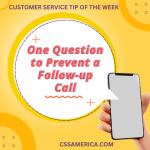We’ve worked with educational organizations at all grade levels over the years. One special and unique characteristic about the staff who work in these organizations is that there’s a clear intent to know about the students as individuals, to focus on them rather than purely focusing on what’s delivered to them.
It’s a good lesson for any business, any industry. Whether you work in sports, local government, healthcare – if you’re going to have more than a 1-time transactional engagement with the customer, here are some lessons to learn from the education industry.
Our elementary and middle school clients make special efforts to get to know the students and their family situations. What is happening to those students personally helps to understand how to deal with those students and their challenges, and identify what kind of a support system they need.
Our high school clients strive to uncover what students are trying to accomplish, and what that next step involves. The high schools are trying to help the students grow while also preparing them for whatever that next place is in life.
Our Higher Ed clients engage the students to continue that development but also to help them plan for the future. Not just that immediate next step, but getting them prepared to be productive members of society, and to set that long-term career track on the right path.
These educational clients understand the need to get to know their customers – their students – more individually. That requires of some that they really understand their personal situations, because that can inform how to engage them. It also involves trying to understand the near-term goals, to see how to help them get to that very next step. In other cases, it’s a matter of understanding their long-term goals or desires, so they can work on a plan to get from today to a future tomorrow.
When you’re thinking about relationship development with your clients, try to remember what impacted you in elementary school or middle school, your priorities and decisions to be made in high school, your goals and long-term vision in college or some other type of advanced training. Then, consider these lessons learned from the education industry.
Grow relationships by understanding your clients more personally, uncovering what they need, and helping to map out a plan for what they want for the future.
Signup for FREE Tips! Contact Us More Resources for You Visit Our Home Page















 Here are 3 customer service scenarios for a college IT department:
Here are 3 customer service scenarios for a college IT department:







